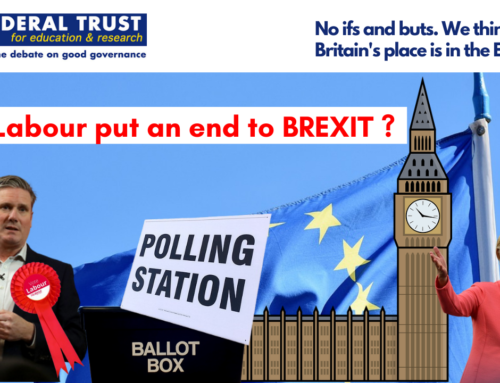Presentation by Dr Hywel Ceri Jones CMG on the occasion of the celebration of the 35th anniversary of Erasmus+ held by the European Commission in Brussels on 14th December 2022.[1]
Note: An expanded version of this speech was published in March 2023 by AIACE Vox
Vice President Schinas and Commissioner Gabriel, friends and colleagues.
You have my warm congratulations for arranging the series of celebrations for this special anniversary, and for showcasing evidence of the impacts of Erasmus+, drawing examples from its enlarged breadth of coverage across Europe and more widely.
I greatly appreciated the September celebration and the opportunity to listen to the inspiring testimonies of the 35 Erasmus alumni highlighting the transformative impact of their experiences on their personal lives and careers, as well as on promoting the Europeanisation of campuses and curricula thanks to the democratising influence of Erasmus across the continent. The growing stock of such testimonies, with examples drawn from all its dimensions, should be made available from the Commission’s rich treasure store of Erasmus experiences to spread its influence much more widely.
As one of its original Founders, I am especially happy to see that the EU places Erasmus+ firmly at the heart of its strategy of development and of its investment in lifelong learning to promote the Europe we need, based on our shared European values, making a powerful contribution to the cohesion and solidarity which underpins the EU’s historic contribution to peace and reconciliation in the world.
I look back with great pride on the two political breakthroughs we secured first in 1976 to launch the EU´s very first Action Programme in educational cooperation, and then in 1987 with the launch of Erasmus itself. From the outset, it was clear that Erasmus responded to a long-term need in the EU. The seed of the original Erasmus concept was in fact planted in 1976 when we secured the first political breakthrough and the Council and Ministers of Education agreed to adopt a first education action programme at European level, including as one of its 22 action points the commitment in the founding Resolution “to promote joint programmes of study in higher education”.
For a ten-year period (1976 to1986) we field-tested the architecture of the programme and were encouraged by the enthusiastic responses of staff and students and higher education institutions in all Member states. It was not conceived as a programme of mobility for mobility’s sake. From the outset, it was designed to promote ways to embed in universities their strategic commitment to Europeanisation in curricula involving an organised period of study abroad.
The institutional stamp of engagement of the university authorities was seen as the sine qua non for such a lasting, long-term effort to embed the capacity to mount and to approve these joint programmes. University authorities were expected to give the formal assurance that the period of study spent abroad would be fully recognised as a necessary and integral part of the students’ final qualification, and explicitly presented as such in the final degree or certificate awarded to students. This precondition was to become a key component of the Erasmus Charter participating universities have been required to sign when committing to participation in the programme.
The popularity of this initial scheme of joint study programmes with over 600 joint programmes, some of them involving highly integrated approaches leading to the award of joint degrees gave the Commission the confidence to present the fully developed Erasmus proposal to the Council. The Council Decision to adopt Erasmus officially in 1987 followed difficult negotiations in the Council with Germany, France and the UK contesting its legal basis and was warmly welcomed by the higher education community across Europe.
With the historic symbolism of its iconic title, Erasmus excited the growing participation of universities which were given the responsibility to initiate their joint programme initiatives from the grassroots with the universities as initiators and drivers of the process. The Erasmus formula has become widely recognised as a tried and trusted system of inter-institutional collaboration, open to all disciplines, with its extra dimension enabling students to enhance their knowledge and skills, thereby significantly improving their employability and career prospects. The Commission’s dedicated investment in partnership building through joint staff cooperation served to guarantee the quality of the joint programmes and their reception and assessment arrangements.
Building on its growing successes and reputation, the Commission and the EU then decided to expand the scope and coverage of the programme, Erasmus is no longer just a European programme. By giving it global outreach through the launch of Erasmus Mundus, new partnerships were attracted with over 80 counties across the globe, including India, China, Brazil and the US. Hundreds of joint masters’ programmes were created, with thousands of student scholarships awarded to participate in them. The Commission’s pioneering Credit Mobility Initiative further attracted partners around the world, funding short term mobility of students, researchers and staff.
This then led to the adoption of the broader umbrella framework of Erasmus+ initiated by the Commission in 2014, making it possible to incorporate a special strand targeting initial and further vocational education, sectors previously underrepresented in international collaboration. This added a crucial strategic dimension to raise the quality and status of vocational studies across Europe. Erasmus+ then also opened the doors to enable participation by schools to help build schools fit for the 21st century, intensifying school cooperation between European partners, and promoting a sense of European and global citizenship for young people and in school curricula.
In addition, the Commission took the opportunity to include in Erasmus+ a much stronger youth solidarity component providing exciting opportunities for young people and youth workers in volunteering projects abroad for humanitarian and social purposes. This proved extremely popular and welcome in the wake of the Covid pandemic with its restrictive impact on the lives and aspirations of young people.
The EU’s approval of the Commission’s proposals for the programming period 2021-2027 was designed to support 12 million persons, extending targeted support to engage many more from disadvantaged backgrounds and those with special needs. The new priorities indicated in this programming provide a digital education dimension with special funding to raise the quality of online education in Europe, and most importantly a greening dimension which made possible a contribution to combatting climate change as part of the EU’s overall strategic commitment to safeguard the future of the planet.
At the same time, the EU also set a new level of ambition for Europe’s global leadership in higher education, science and innovation, with Erasmus+ and Horizon Europe working in synergy, scaling up international academic cooperation on an unprecedented scale. Today I wish to stress the vital importance of the continuing expansion of these twin engines of investment in research and education to serve as central pillars of strategic EU support promoting a pro sustainability strategy for the future of Europe, helping to build a knowledge based economy and inclusive society across Europe.
The evidence we have from Commission reports and from today’s deliberations clearly confirm that Erasmus+ is going from strength to strength. We have much to celebrate on this anniversary and to look forward to the future with the Erasmus+ dynamic in the heart and soul of the Europe we need. The very special role played by Erasmus+ to bring people together in cooperation across national frontiers should be established as a permanent EU effort to oil the wheels of partnership building and cooperation across the European continent. As Vice President Schinas suggested at our September celebration, I too wish to encourage the Commission to actively seek complementary funding partnerships to Erasmus+ and Horizon Research by building cooperation with the worlds of industry, commerce and finance and also with private foundations, companies and regional and local authorities. This would ensure the largest possible impact of the EU’s strategic investment to extend Erasmus opportunities to young people as a right and also enhance the living and working standards of European citizens, young and older. The 2023 Year of European Skills soon to be celebrated provides an ideal opportunity for the Commission to launch such a mobilising idea.
In conclusion, I am happy to applaud the new impetus given to Erasmus+ as a result of the ambitious proposals set out in President Macron’s Future of Europe speech in 2017. Inspired by Macron’s proposals and with the full backing of the EU, the Commission has brokered (to specify, even as a footnote) several hundred European alliances of universities with additional funding through Erasmus+ to intensify their cooperation and boost their capacity to meet global challenges, whilst also generating a wider and deeper sense of belonging to Europe. Since the firm foundations of the original Erasmus architecture for cooperation between universities and higher education are still in place, and work well, with many successful examples of joint degrees and qualifications, the new Macron inspired ideas are now giving an extra impetus to generate through Erasmus+ joint European degrees, with European labelling and the initiation of the new European student card.
I know I speak for my friends and colleagues when I say we look back with pride on the triumph of our teamwork in the creation and negotiation of Erasmus, and its widely agreed recognition as a very special treasure valued across the European continent and beyond. I extend my warmest congratulations and best wishes to the present Commission team with its determined commitment to the continuing success of “our” programme as advocated today by Commissioner Gabriel and Vice President Schinas with such passion and conviction.
Note
[1] For health reasons Dr Hywel Ceri Jones was unable to be present at the celebration event at the last minute.






Leave A Comment